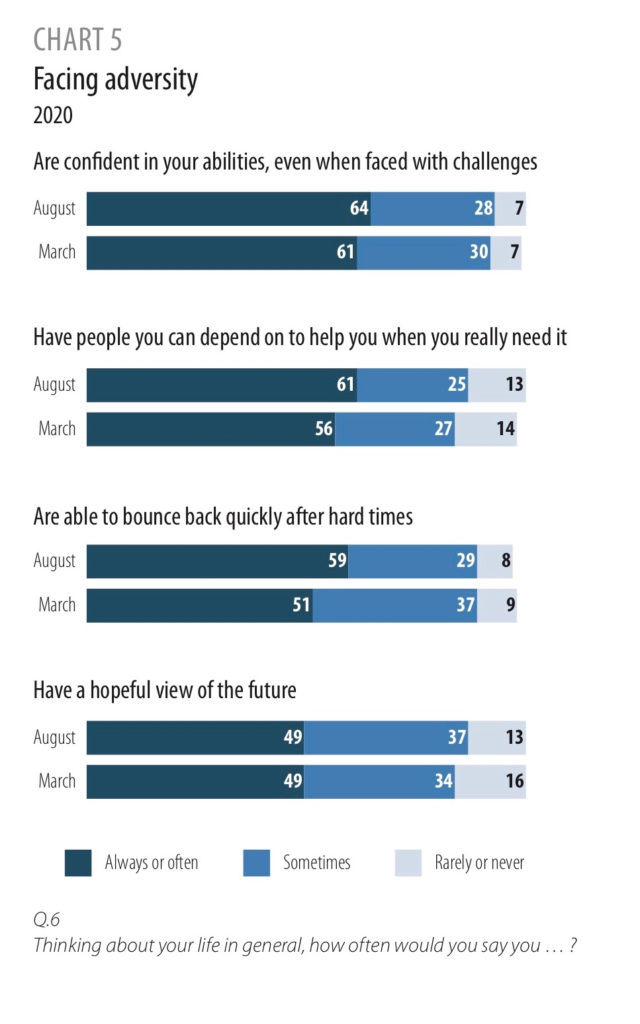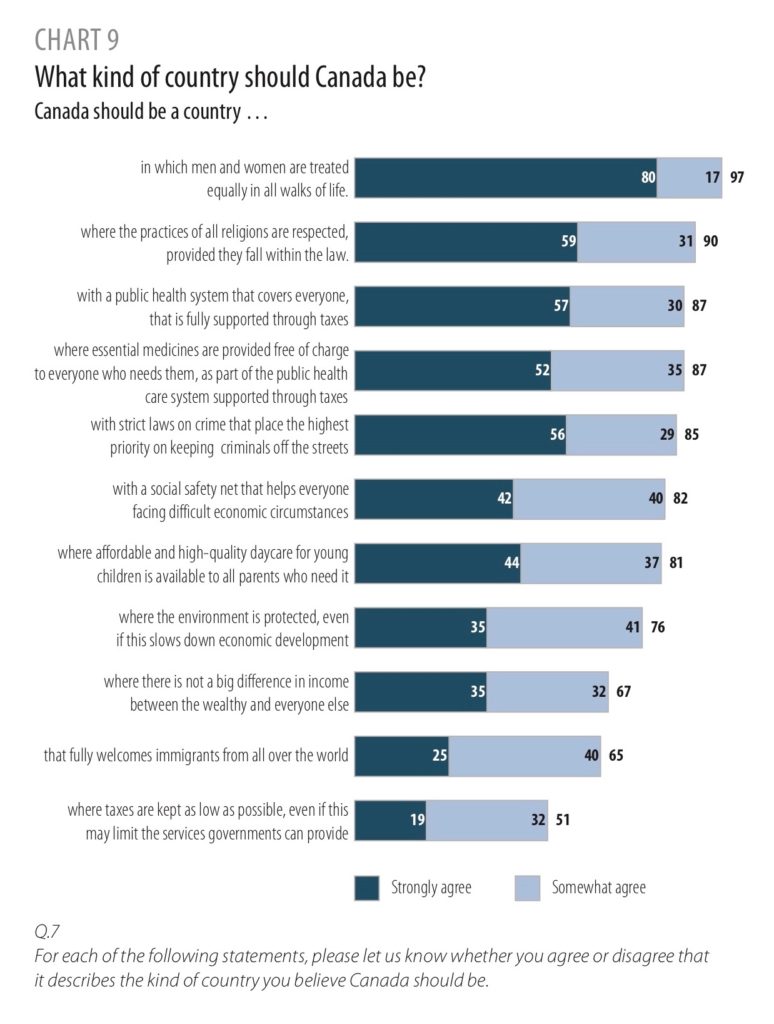(September 28, 2020) A new report from the Environics Institute and Vancity serves as a check-in with the nation, helping answer the question of how Canadians are doing in the fall out from the financial stress and social isolation necessitated by the coronavirus pandemic.
How are we feeling about ourselves? About each other? Is there something about our social fabric that’s changed since the pandemic? Are we still the same country? Are we managing?
It’s been tough.
By April, three million Canadians become unemployed. By July, the federal government reported having committed over $212 billion in direct support to individuals and businesses.
Pandemic conditions have removed the public square. And whether the public square is a local pub, a riding association meeting, book launch or public library gathering, we’re missing the ability to talk to each other en masse, to engage and debate.
A Better Canada: Values and Priorities after COVID-19, issued on September 22, 2020, is a comprehensive study of public opinion from surveys conducted at the end of the summer of 2020, roughly five months after the COVID-19 pandemic took hold in Canada. It was conducted by Environics Institute for Survey Research in partnership with Vancity, a 545,000-member financial co‑operative operating in British Columbia with assets of $28 billion. The study says it “builds extensively on the results of previous surveys, in order to explore whether and how Canadian attitudes have changed in the wake of the pandemic.”
The impact of the pandemic on peoples’ lives has been significant.
Seventy percent of people surveyed said the pandemic has greatly or somewhat affected their lives. If you are an immigrant or racialized minority, that number went up to 79%. If you have a child under the age of five, the number increases to 80%. If you are an immigrant or racialized minority with a child under the age of five, the number jumps to 87%.
For women, the impact has been harder:
- 46% of women, as opposed to 32% of men, experienced more depression, anxiety or panic attacks; or had difficulty sleeping
- 33% of women, as opposed to 28% of men, became unemployed; or been asked to reduce the number of hours per week they worked
- 11% of women, as opposed to 9% of men, have been unable to pay their rent or mortgage; or missed a major bill or credit card payment
Yet, Canadians are generally feeling they can weather the storm. Most (65%) say they feel confident in their own abilities to manage; 61% say they have people they can depend on if they need it. The number of people feeling they can cope or have support to turn to increased since March.

At the same time, the study says, “two in five Canadians (42%) are very (14%) or somewhat (28%) worried about themselves or a member of their immediate family finding or keeping a stable, full-time job; a higher proportion (52%) are not very (26%) or not at all (26%) worried. The proportion that is worried is slightly lower than was the case in March of this year (47%), as the pandemic began to take hold in Canada and is comparable to the level seen in late 2019 (44%).”
Relatively few (17%) Canadians say that their personal financial situation today is better than it was six months ago; a larger proportion (28%) says their financial situation is worse, and a majority say it is the same. These views are essentially at the same as they were before the pandemic
With news sources filled with daily information about the way in which the United States has failed at controlling the pandemic and how American society appears to be wrenching apart at the seams, and especially in light of the rise of white supremacism in Canada, a Canadian might well wonder if the values this country have traditionally upheld are now holding,
A Better Canada suggests they are. And there is support for change. The report says, “there is widespread public support for improvements in a number of policy areas, such as the inclusion of essential medicines under the rubric of Canada’s public health care system, easier access for parents to child care, the provision of adequate sick leave, and the reduction of income inequality.”
“Rising inequality was a pre-existing condition of the Canadian economy before the pandemic hit but the problem has been laid bare by Covid-19,” says interim president and CEO of Vancity Christine Bergeron. “Our research shows that Canadians want change, and they want action on climate and inequality. We’re at a clutch moment in our history as our governments consider how best to recover from the impact of the Covid crisis. We have the opportunity to build the kind of society Canadians want, one that is greener and more just.”

“This survey finds that Canadians are feeling anxious but also resilient and want to see policies that would better protect those who have borne the brunt of the pandemic’s impact,” says Michael Adams, founder and president, Environics Institute for Survey Research. “And rather than fiscal retrenchment, citizens continue to want public spending that promotes social and environmental justice.”
On September 23rd, the prime minister addressed the nation on the subject of the pandemic saying the “second wave isn’t just starting, it’s already underway. The numbers are clear. Back on March 13th, when we went into lockdown, there were 47 new cases of COVID-19. Yesterday alone, we had well over a thousand. We’re on the brink of a fall that could be much worse than the spring.”
The Emergency Wage Subsidy will be extended to next summer.
“There is a covenant between government and the people government serves,” says the prime minister. “You need to know that you can rely on us, just like you can rely on each other.”
Yet the fate of the current minority government hangs in the balance. The government’s Speech from the Throne was held on September 23, a speech in which the government sets its overall direction and goals. If the government does not receive support from one of the major opposition parties, it will trigger an election.
The Conservative Party of Canada (CPC) made their position known right after the speech they would vote no confidence, with leader Erin O’Toole having previously said, “overcoming western alienation” must be part of the pandemic recovery.
Bloc Quebecois (BQ) Leader Yves-François Blanchet also threw down the gauntlet saying, “Mr Trudeau has one week to provide unconditional transfers to Quebec for health care, otherwise the Bloc Québécois will vote against this throne speech.”
NDP Leader Jagmeet Singh says he wants two weeks’ paid sick leave and more support for unemployed before he’ll support the speech.
All this is unfolding against the backdrop of the CPC and BQ leaders living in quarantine because they have COVID 19.
It remains a mystery how a comprehensive study of how Canadians are doing, and the political landscape demonstrated in their House of Commons can be so incongruous.
One shows that Canadians feel that, with more than $200 billion of government support to the end of July, they can weather the coronavirus storm, are no worse off than they ever were, and that, moving forward, they believe in reducing income inequality. Yet the values articulated by Canada’s political parties appear to be mostly dependent on where people live.
And the question becomes are the things which hold us together stronger than what keeps us apart.
Charities, of course, try to help the 10% or 20% of people who are not hopeful about the future, who have missed payments because of the pandemic, who are overwhelmed. And they fundraise from the rest of the population. So, overall, this study seems positive for people who work in fundraising departments.
Yet, 70% of the revenues received by charitable organizations are provided by government. And the insecurity on that level has the potential to be far, far more impactful.
Feature Photo: Julian Wan